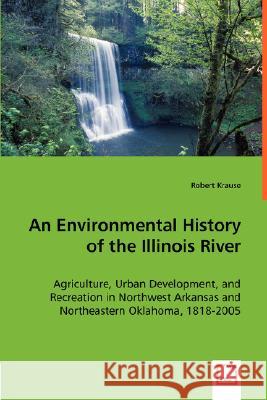An Environmental History of the Illinois River » książka
An Environmental History of the Illinois River
ISBN-13: 9783639007794 / Angielski / Miękka / 2008 / 100 str.
In this work, Robert Krause of Oklahoma State University explores the dynamic interplay between agriculture, urban development, and human recreation on the Illinois River. In providing an environmental narrative for the region, the author argues that commercialized poultry production and the development of global corporations like Wal-Mart and Tyson Foods have left a largely negative impact upon the natural environment of northwest Arkansas and northeastern Oklahoma. Flowing through the two states is the Illinois River, one of the most visited recreation areas in the South-Central United States. Due to rapid urban development and runoff from poultry and cattle farms in northwest Arkansas, the River has been severely impacted by algae blooms, declining tourism, and an increasing socioeconomic polarity between northwest Arkansas and northeastern Oklahoma. Emphasizing the importance of political cooperation and human environmental accountability, Mr. Krause skillfully combines interdisciplinary scholarship with a vision for an environmentally sustainable future in this concise work."
In this work, Robert Krause of Oklahoma State University explores the dynamic interplay between agriculture, urban development, and human recreation on the Illinois River. In providing an environmental narrative for the region, the author argues that commercialized poultry production and the development of global corporations like Wal-Mart and Tyson Foods have left a largely negative impact upon the natural environment of northwest Arkansas and northeastern Oklahoma. Flowing through the two states is the Illinois River, one of the most visited recreation areas in the South-Central United States. Due to rapid urban development and runoff from poultry and cattle farms in northwest Arkansas, the River has been severely impacted by algae blooms, declining tourism, and an increasing socioeconomic polarity between northwest Arkansas and northeastern Oklahoma. Emphasizing the importance of political cooperation and human environmental accountability, Mr. Krause skillfully combines interdisciplinary scholarship with a vision for an environmentally sustainable future in this concise work.











